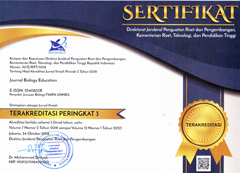The Application of 7E Learning Cycle Model Based on Multiple Representations on Understanding the Concept of Classification and Communication Skills in Protist Learning Material
Abstract
The purpose of this study was to examine the effect of the 7E learning cycle model based on multiple representations on students understanding the concepts of classification and communication skills on Protist learning material. The research method uses a quasi-experimental design with a nonequivalent control group. The research sample is class X MIPA 4 and X MIPA 5 at MAN 02 Brebes. The data analysis technique used independent sample t-test. The results showed that understanding the classification concept and communication skills had a sig (2-tailed) value of 0.000 < 0.05 so that there was a significant difference in the average post-test scores and skill scores between the two classes. The percentage of understanding the concepts of classification in the experimental class was 33.33% (high) and 66.67% (medium), while the control class was 97.14% (medium) and 2.86% (low). The classical completeness of understanding the concept of classification in the experimental class was 16.67 %, while the control class was 0%. The percentage of communication skills in the experimental class is 75% (medium) and 25% (low), while the control class is 20% (medium) and 80% (low). The percentage of the implementation of the learning model in the experimental class based on observation was 100% (high), while the student questionnaire responses were 55.55% (high) and 44.45% (medium). Based on the research data, it can be concluded that the 7E learning cycle model based on multiple representations has a significant effect on understanding the concepts of classification and communication skills in Protist learning material.
The copyright of the article once it is accepted for publication shall be assigned to the journal as the publisher. The intended copyright includes the right to publish the article in various forms (including reprints). The journal maintains the publishing rights to the published articles.
This work is licensed under a Creative Commons Attribution 4.0 International License.







